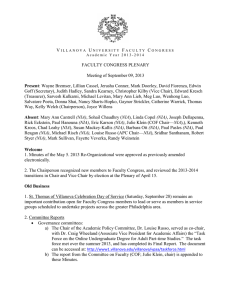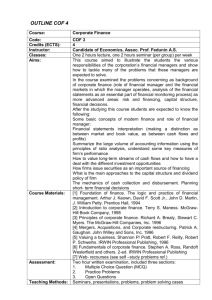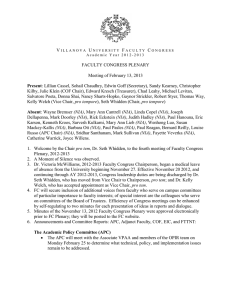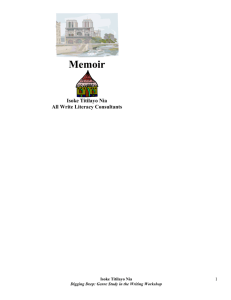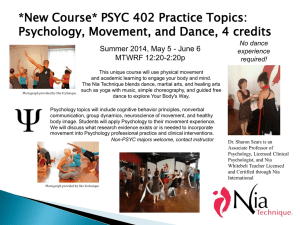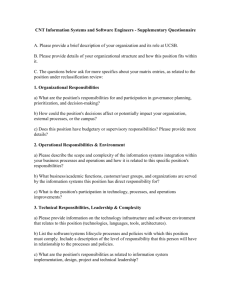2011-02-24.doc
advertisement
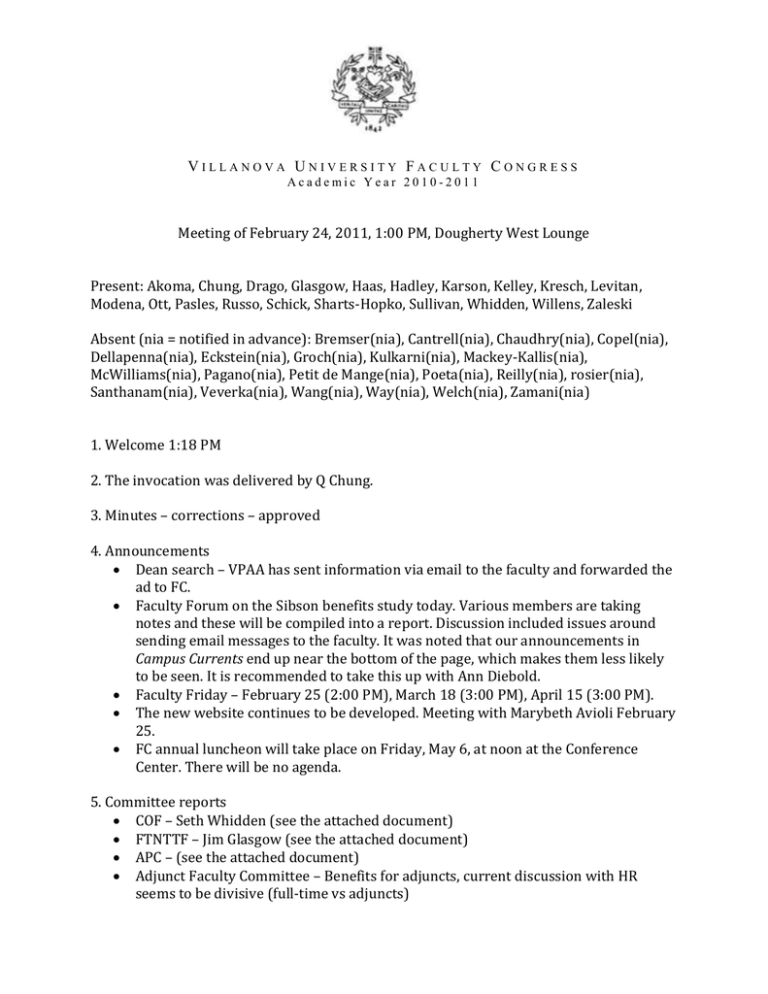
VILLANOVA UNIVERSITY FACULTY CONGRESS Academic Year 2010-2011 Meeting of February 24, 2011, 1:00 PM, Dougherty West Lounge Present: Akoma, Chung, Drago, Glasgow, Haas, Hadley, Karson, Kelley, Kresch, Levitan, Modena, Ott, Pasles, Russo, Schick, Sharts-Hopko, Sullivan, Whidden, Willens, Zaleski Absent (nia = notified in advance): Bremser(nia), Cantrell(nia), Chaudhry(nia), Copel(nia), Dellapenna(nia), Eckstein(nia), Groch(nia), Kulkarni(nia), Mackey-Kallis(nia), McWilliams(nia), Pagano(nia), Petit de Mange(nia), Poeta(nia), Reilly(nia), rosier(nia), Santhanam(nia), Veverka(nia), Wang(nia), Way(nia), Welch(nia), Zamani(nia) 1. Welcome 1:18 PM 2. The invocation was delivered by Q Chung. 3. Minutes – corrections – approved 4. Announcements Dean search – VPAA has sent information via email to the faculty and forwarded the ad to FC. Faculty Forum on the Sibson benefits study today. Various members are taking notes and these will be compiled into a report. Discussion included issues around sending email messages to the faculty. It was noted that our announcements in Campus Currents end up near the bottom of the page, which makes them less likely to be seen. It is recommended to take this up with Ann Diebold. Faculty Friday – February 25 (2:00 PM), March 18 (3:00 PM), April 15 (3:00 PM). The new website continues to be developed. Meeting with Marybeth Avioli February 25. FC annual luncheon will take place on Friday, May 6, at noon at the Conference Center. There will be no agenda. 5. Committee reports COF – Seth Whidden (see the attached document) FTNTTF – Jim Glasgow (see the attached document) APC – (see the attached document) Adjunct Faculty Committee – Benefits for adjuncts, current discussion with HR seems to be divisive (full-time vs adjuncts) Constitution committee – met twice and considering changes, two main issues o Plan to divide the document into two parts: I Constitution (to be left alone mostly) and II Bylaws (more changeable) o Succession of officers: Vice Chair of Faculty Congress becomes Chair after two years (probably needs to be codified in bylaws) Treasurer & Secretary are elected normally, also immediate past chair can be created. 6. Closure on Faculty Football Survey – draft document emailed to FC today, discussed in meeting Nancy Sharts-Hopko & Mike Levitan moved for acceptance of the report from the Faculty Congress on the findings of the survey – approved unanimously. 7. Faculty Salary Analysis Fr. Ellis has commissioned a study of faculty salaries, both external and internal Executive committee proposal to resolve to request automatic information to be delivered to the Faculty Congress for appropriate dissemination – Language is under consideration (median rather than mean recommended – Distributions would be most useful, at least quartiles at this point) – Consider small cell sizes so as not to share private information – FC will discuss via email and bring to next meeting for a resolution. Related issue of the family leave policy has been brought to Fr. Ellis with recommendations for making the process uniform across all units and for all faculty members and that these policies be aligned with the University mission. Fr. Ellis replied that the Council of Deans decided the current policies are aligned with the mission and that the most significant issue is one of communication of what is available. Plans are to address the issue through updates to the Faculty Handbook and through information to and discussion with chairs. 8. Follow-up on Sibson Benefits Study – discussion via COF 9. Announcements Fr. Peter will hold a Town Hall meeting on March 17 in place of the “Benefits Committee” meeting. Faculty Congress support for the current form of Faculty Funds for Students is withdrawn because of the difference between its implementation by the Development Office and the original faculty intent. 10. The meeting adjourned at 2:33 PM. Respectfully submitted, Joe Schick Faculty Congress Secretary Reports attached… VILLANOVA UNIVERSITY UNIVERSITY SENATE & FACULTY CONGRESS COMMITTEE ON FACULTY Academic Year 2010-2011 Draft of report to Faculty Congress Thursday 25 February 2011 During the COF meeting of Monday 7 February… Maggie Wang agreed to join Tom Way on the Awards subcommittee, replacing Joe Schick, for the next two academic years (2011-12 and 2012-13). The Chair is following up on several initiatives flowing through the VPAA: College staff awards, Distinguished Professor Proposal, and Faculty Leave Policy (where work continues). COF members renewed commitment to reach out to constituents in advance of the Sibson Benefits Study presentations. COF members are at both meetings, taking notes, facilitating post-meeting discussions. Among the issues of particular concern to COF are: a. Changes in prescription plan b. PPO vs. HMO Support by the University c. Changes in benefits for pre- and post-1999 faculty members d. Concern over how faculty are represented in determining benefit levels. e. Faculty access to the data available to the administration. (there is a great deal of frustration over how one-sided this is) Ellen LaCorte and Ray Duffy have agreed to attend the next (Mar. 8) COF meeting for follow-up. Preparation for this meeting will be facilitated by Eric Karson, who volunteered to consolidate all the notes from the meeting as a basis for our discussions. FTNTT: Last year Congress reiterated the voting rights to FTNTT Faculty. One issue still in the air is the ability of FTNTTF to vote for Department Chair. Two new proposals were received from Jim Glasgow and Nancy Kelley. Those proposals are: Proposal #1) All full-time, non-tenure track faculty (FTNTTF) who have completed four years of continuous service in this capacity be granted full voting rights on the department chair [which would require amending the Faculty Handbook]. OR Proposal #2) All full time non-tenure track faculty (FTNTTF) who have completed four years of continuous service in this capacity be granted full voting rights on the department chair (which would require amending the Faculty handbook). If they so elect, the tenured faculty may call for a separate recording of the tenured and non-tenured faculty votes. Sohail Chaudhry, Linda Copel, Joseph Dellapenna, Judith Hadley, Fr. Kail Ellis (ex officio), Eric Karson, Sarvesh Kulkarni, Victoria McWilliams (ex officio), Barbara Ott, Paul Rosier, Joseph Schick, Maggie Wang, Thomas Way, Seth Whidden (chair), Peter Zaleski Echoing earlier concerns, issues raised were: 1] FTNTTF are hired by a very different method than tenure track faculty. Most often there is not a full “search” process involving the Department, but FTNTTF are sometimes hired at the discretion of the Chair; 2] How FTNTTF are evaluated, as there appears to be varied procedures across departments; and 3] That FTNTTF are hired specifically for teaching, sometimes for teaching and service, while tenure-track faculty have a significant research component in their work that the Chair is responsible for supporting. These concerns were forwarded to the FTNTTF representatives for their response. 8. COF members commented on the differences between COF nominations for Board of Trustees standing committees and the final nominations from the university president. COF will raise this matter with Fr. Peter during dinner with him at the end of March. 9. The meeting was adjourned at 12:00 p.m. Next meeting: March 8, 2:30 – 4:00, Devon Room Connelly Ctr. February 21, 2011 To: Faculty Congress From: Jim Glasgow & Nancy Kelley Re: Report on Full time, Non-Tenure Track, Faculty Activities First, to simplify the lengthy acronym reference to the FTNTTF, we propose using to nomenclature of CNT, continuing non-tenure. That is the terminology now employed in the School of Business. It identifies that portion of the full-time faculty who are hired with the intent of continuing indefinitely. The role of CNT faculty is to teach (4/4 load) and to provide substantial service to the college and university. The full-time, continuing non-tenured faculty are an integral part of Villanova University. Their primary mission is aligned with the primary mission of the university, which is to teach. They are eligible to be a member of the Senate, and to chair and be a member of important academic and administrative committees within colleges and at the university level. They are hired with multi-year contracts awarded based on continuing effective performance in the areas of teaching and service. They seek full inclusion in the voting for departmental chairs. Background: Two proposals to include CNT faculty in the voting for Departmental Chairs were submitted to the Committee on Faculty for their consideration. The impetus for reintroducing the proposals was that the multi-year contracts for CNT faculty were not offered until fall of 2010, which was after the initial proposal was voted down by the Faculty Congress. Now there is a mechanism in place for mandatory reviews of CNT, which was not in place at the time the proposal was considered last spring. In addition, a second proposal was offered that would allow for the separate recording of the Non Tenure vote. These two proposals are detailed as follows: Proposal #1) All full-time, non-tenure track faculty (FTNTTF) who have completed four years of continuous service in this capacity be granted full voting rights on the department chair [which would require amending the Faculty Handbook]. Proposal #2) All full time non-tenure track faculty (FTNTTF) who have completed four years of continuous service in this capacity be granted full voting rights on the department chair (which would require amending the Faculty handbook). If they so elect, the tenured faculty may call for a separate recording of the tenured and non-tenured faculty votes. Rationale for Proposals 1 and 2: The rationale is that the hiring process for the FTNTTF (CNT) is comparable to the hiring process for tenure track faculty. (The primary difference is that CNT faculty do not have a research requirement.) CNT serve a one year appointment when hired and are evaluated at the end of that time. If they are positively evaluated, they are granted a multi-year (typically a three year) contract. During the contract period, they are evaluated again by their department chairperson. If they are again positively evaluated, they are granted another multi-year contract, and the cycle of evaluation-based contracts continues. Thus, a full time, continuing non-tenured faculty member, who COMPLETED FOUR YEARS IN THAT CAPACITY, year would have received their second multi-year contract. Only at that point would they be able to participate in the vote for department chair. COF Feedback: The COF reviewed Proposals 1 and 2 at the February 7, 2011 meeting. Both proposals were rejected. The following concerns about FTNTTF (CNT) voting for department chair were cited: - CNT faculty are not all hired by departmental search committee - CNT faculty are not evaluated in the same way as are tenure-track and tenured faculty (and in fact in some departments and colleges we are not certain that they are evaluated with the regularity that is assumed in their contracts, and to which you refer in your proposal) - CNT faculty employment responsibilities are different from those of the tenure-track and tenured faculty in the same department/program/college. o Jim Glasgow: It should be noted that most CNT faculty do not conduct research, and are evaluated based on teaching and service only. However, some CNT faculty choose to do research, even though this contribution is not part of their overall evaluation by the department chairperson. Some members of the COF acknowledged that some departments do treat the evaluation process for CNT faculty members just as seriously as they do the evaluation of Tenure and Tenure Track faculty. However, some members of the COF cited instances, without identifying the college or department, where such rigor is not applied. The feedback is appreciated, but without the concerns being supported with specific examples, responding to these issues is challenging. Next Steps: I would like to propose two possible options for proceeding with this issue. Option A Survey each Dean to confirm their college’s policies on hiring and evaluating all full-time continuing non-tenure, tenure-track, and tenured faculty to ensure these processes are aligned. The goal is that all departments within a college would synchronize their practices for hiring and evaluation of all fulltime faculty so the vetting and evaluation processes are comparable, based on the responsibilities of the position. The Dean would then confirm the college’s policy and disseminate it in writing to all departments and personnel to ensure consistent compliance. We would then present the CNT voting proposal to the COF again with the belief that such alignment of hiring and evaluation procedures for all continuing full time faculty will assuage their concerns and facilitate a favorable vote on the proposal, in that body, and in the other legislative bodies of the faculty. Option B Amend the handbook so that the decision to include full-time, continuing non-tenured faculty in the voting process for Department Chair is set by each College, or by each department within the college. Each department would then determine to include, or not include, full-time, continuing non-tenured faculty in the voting process for Department Chair. APC report: Attached please find the APC approved (2/21/11) updates to the Final Examination Policy in the Faculty Handbook. All additions and changes are noted in the draft. It now needs to be discussed and hopefully approved by COF before going to the V.P.A.A. for final changes. This was the bulk of our meeting on Monday and serves as a report on what the APC has been doing for the FC meeting tomorrow Q. The rationale for the changes to the policy is that there was no allowance for classes, especially those that meet once per week, to use the final class period of the final week for final presentations. Although other classes (and even those meeting once per week) could simply have their students turn in any final major written assignments prior to the final day of class--in order to preserve the students ability to start preparing for finals early since we cannot accommodate two readings days into the academic calendar---there was no accommodation for oral presentations or for those lab courses which were stand alone and which did not have a designated final exam slot (thus necessitating the use of the final meeting, once a week, during the final week of classes, to do a final assessment of the students’ work in lab). The other major change has to do with clarifying those policies which apply to undergraduates and not graduate students and those which apply to both. With Adele Lindenmeyr’s guidance (Graduate Dean A&S) we separated out relevant policies as is reflected in the attached draft. As a general comment we felt that since we have been pushing for greater awareness of this policy, both for students and faculty, it is important that the policy is workable and rational if we expect faculty to adhere to it. Susan
